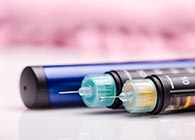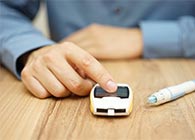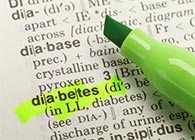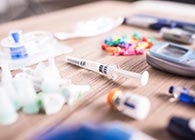New research breakthrough in Type 1 diabetes
An article in The New York Times on December 3rd made headlines that are especially important for people living with Type 1 diabetes. It announced that Brian Shelton from Ohio had been cured of Type 1 diabetes. Curing Type 1 requires a renewable source of beta cells that can be produced in the laboratory. Once placed into the body, they need to restore insulin production and automatically regulate blood-glucose levels.
On June 29th, Brian received an infusion of cells, grown from stem cells which were just like the insulin-producing pancreas cells his body lacked. Now his body automatically controls its insulin production and blood sugar levels. He may be the first person to be cured of Type 1 diabetes with a new treatment that leads us all to hope that help may be coming for people with Type 1 diabetes.
This study has not yet been published in a peer-reviewed journal so the results of the trial are not yet known. The findings in this one man need to be replicated in many more people and other questions arise:
- will there be unexpected adverse effects,
- people will need to take immunosuppressants and what effects of this are,
- will the cells last for a lifetime or does the treatment have to be repeated.
Nevertheless, it is an amazing result.
This latest development was started by a Harvard University biologist, Doug Melton, who has two children with Type 1 diabetes. The challenge was to work out what sequence of chemical messages would turn stem cells into insulin-secreting islet cells. This involved unravelling normal pancreatic development, working out how islets are made in the pancreas and conducting endless experiments to steer embryonic stem cells to becoming islets.
The next step for Melton was to start a company to finance taking this procedure to the market and later when the stage of clinical trials was reached, pharmaceutical company, Vertex acquired Semma for $950 million.
The only ‘cure’ that has ever worked is a pancreas transplant but a shortage of organs makes this unrealistic for the majority of people or a transplant of the insulin-producing cells, known as islet cells. However, this latest development gives us hope.
And 2 days later a Canadian study – stem cell-based treatment may help Type 1 diabetes patients produce insulin
Canadian researchers have carried out similar research to investigate whether new stem cell-based treatment that could one day eliminate Type 1 diabetes patients’ dependence on insulin injections and also transform many other health conditions.
The study was conducted by researchers at the University of British Columbia and Vancouver Coastal Health (VCH) and shows that a tiny implant infused with stem cells can help the body produce insulin on its own.
Fifteen patients living with Type 1 diabetes took part and they had a small device implanted in their abdomen. Each device contained millions of lab-grown cells that originated from a single stem cell line and were “coached” into becoming beta cells, which make insulin. Six months later, the cells had not only survived, they had started producing tiny bits of insulin when needed.
The study used C-peptide, (released into the blood at the same time as insulin is produced), to measure the amount of insulin released by the implanted cells. The findings showed:
- C-peptide levels rose after eating a meal, showing that they were creating insulin naturally.
- People in the study spent 13% more time in target blood sugar range showing better control of their diabetes.
- Some were even able to reduce the amount of insulin they injected as a result of the implant.
While an exciting development, the study has its limitations. It was a very small study with only 15 participants so researchers want to broaden the study to also include placebos.
In 2022, the researchers expect to begin to do the procedure without immunosuppression drugs, using a novel method of modifying the cells through a genetic technique that will allow the cells to produce their own immunosuppression. They are also hoping that within next year, somebody in this study will be able to stop taking insulin for the first time since they were diagnosed without having to take anti-rejection drugs.
(Published in the journal, Cell Stem Cell on December 7th 2021)
Back to news archive



































